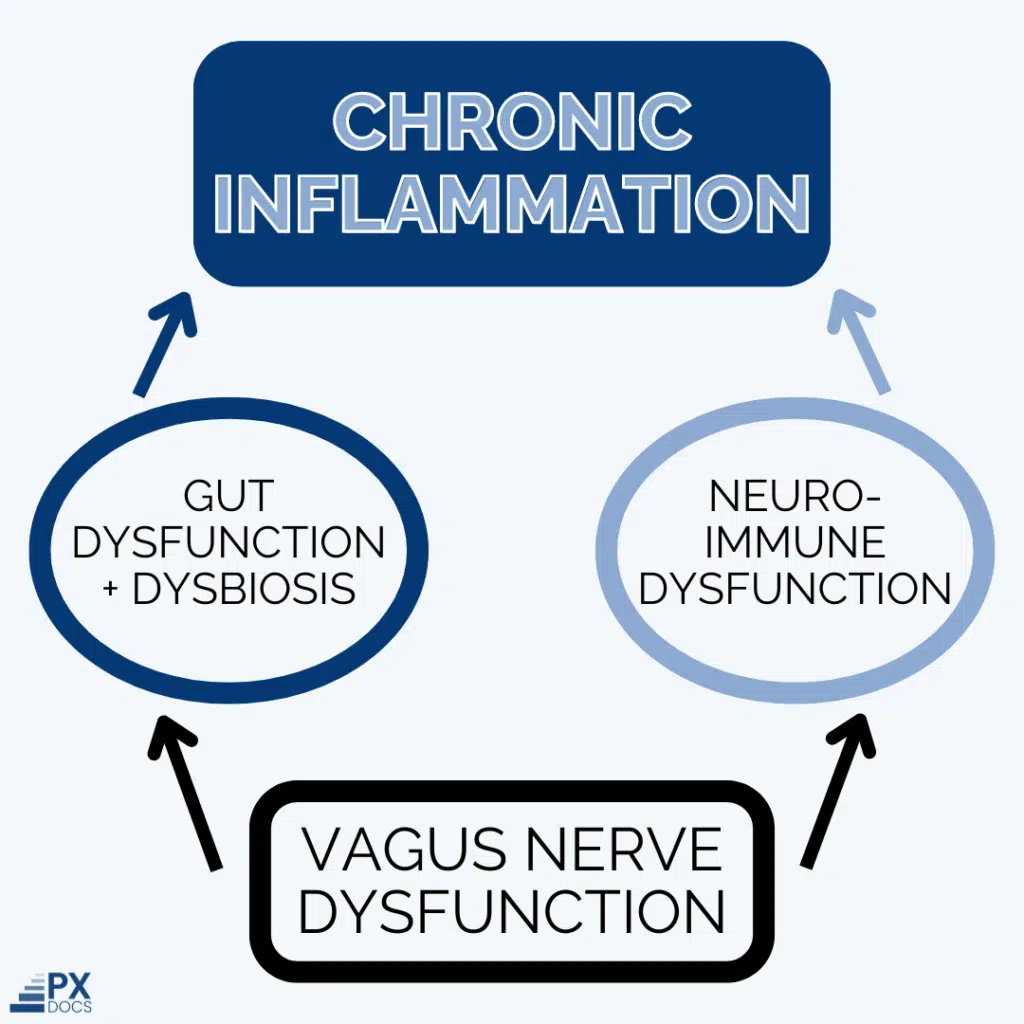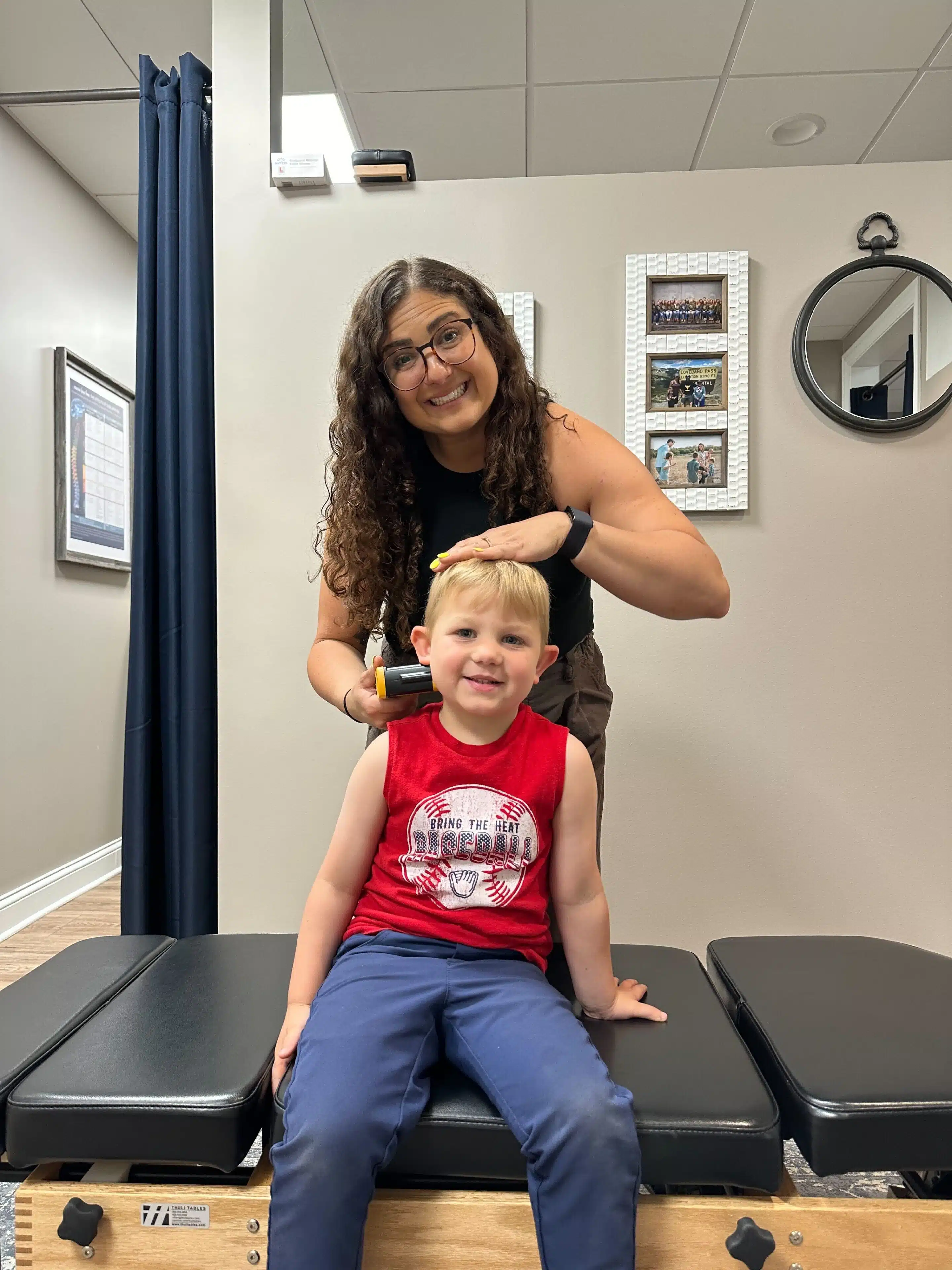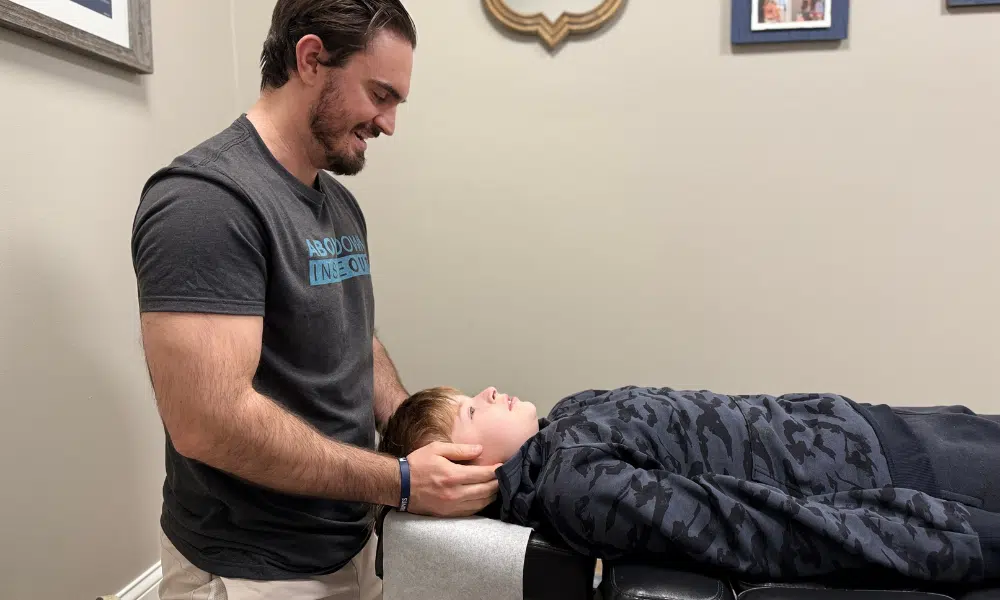Chronic inflammatory conditions like asthma, allergies, arthritis, irritable bowel syndrome, and even heart disease are on the rise. Inflammation is often the root trigger of diseases that ultimately cause three out of five people worldwide to die.
While anti-inflammatory medications might help manage symptoms, they have side effects (like chronic pain) and don’t address the root causes. Fortunately, emerging research shows that a key to resolving inflammation is supporting the autonomic nervous system—specifically the vagus nerve inflammatory reflex.
The vagus nerve coordinates the complex interplay between immune regulation and metabolic functions through neurological communication pathways. When there is interference or dysregulation within the nervous system’s function, called subluxation, one of the first bodily systems negatively affected is the immune system and inflammatory cascade. This neurological dysfunction can then cause dysautonomia, resulting in a wide range of inflammation-related symptoms, such as autoimmune disorders, cognitive problems, and mental health issues.
This article will, therefore, explore the critical role the vagus nerve plays in keeping one’s nervous system and inflammation regulated, how this system breaks down, and the cutting-edge neurologically-focused solutions available to get inflammation under control without the use of drugs and medications, or even hard-to-manage diet changes and thousands of dollars of supplements, vitamins, essential oils, and infrared saunas.
What is the Vagus Nerve, and Why Is It Important?
The vagus nerve is the longest cranial nerve, extending from the brainstem to the abdomen. This critical nerve coordinates the activity of the parasympathetic “rest and digest” nervous system, which opposes the action of the sympathetic “fight or flight” system.
Through its winding pathway to organs, the aptly nicknamed “wandering nerve” controls key functions like digestion, heart rate, immunity, stress response, and more.
Over 75% of all nerve fibers that stimulate the relaxation response travel along the vagus nerve. This makes the vagus nerve indispensable for activating the body’s self-healing and recovery processes. However, disruptions anywhere along this crucial pathway can lead to systemic breakdowns in metabolic, inflammation, and neurotransmitter balance.
Disruption anywhere along this pathway can fundamentally alter the set point for inflammation. While modern medicine will likely take this modern understanding of how essential the autonomic nervous system and vagus nerve are in modulating inflammation and use it to develop more medications and biomedical devices to target this key pathway, the good news for parents and patients is that a safe, natural, and effective care option for this already exists.
Understanding Inflammation and The Vagus Nerve
Inflammation is often seen as a negative thing, but it plays a crucial role in defending the body from injury and fighting off harmful invaders. However, if inflammation is not regulated correctly, it can lead to damage. Normally, cytokines—powerful chemical messengers—activate and then turn off acute inflammatory responses. However, when there is a dysfunction in the neural pathways responsible for regulating this process, it can result in chronic inflammation.
The vagus nerve and its reflexes comprise a sophisticated “air control tower” over inflammation. This critical cranial nerve runs from the brainstem to major organs, coordinating the parasympathetic “rest and digest” response. Research by Dr. Kevin Tracey discovered that along its route, the vagus nerve detects inflammatory cytokines via sensors and relays signals back to the brain.
In turn, the brain initiates precise counter-regulatory signals back through the vagus nerve to immune cell receptors, shutting off further cytokine release. This neural circuit to limit excessive inflammation is called the “inflammatory reflex.”
When operating smoothly, the vagus nerve provides the moment-to-moment calibrations that resolve acute inflammation and prevent it from becoming systemic and prolonged. Breakdowns anywhere along the vagus nerve reflex pathway disrupt this immune system, setting the stage for chronic inflammation.
Vagus Nerve Dysfunction’s Role in Inflammation

When the vagus nerve cannot effectively moderate inflammation, it leads to numerous vagus nerve disorders. Research reveals that anything that damages vagus nerve fibers can hinder their ability to release acetylcholine, the neurotransmitter that signals immune cells to restrain cytokine production.
Common culprits that reduce vagus nerve transmission include diabetes, viral infections, stress, medications, surgery, and physical trauma. While those are more commonly known triggers of vagus nerve dysfunction, far more overlooked causes include physical damage and injury to the vagus nerve via birth interventions such as forceps, vacuum extraction, induction, and c-section births. Additionally, research now confirms that excessive stress and other issues during the “critical windows” of fetal development in-utero can greatly interfere with the initial development of the vagus nerve and autonomic nervous system, setting the stage for all sorts of issues later on in life.
Collectively this creates a “Perfect Storm” where the function of the vagus nerve is disrupted and interfered with. When vagus nerve dysfunction, subluxation, and dysautonomia set in place early on during a child’s development, all sorts of neurodevelopmental and autoimmune issues can occur as a result.
Over months and years, systemic inflammation fuels oxidative damage, tissue degeneration, and chronic disease processes. Sustained high cytokine levels interfere with insulin signaling, metabolism, mood regulation, and cardiovascular function.
This underlies disorders like autism, anxiety, diabetes, depression, fatigue, fibromyalgia, and heart problems. Fortunately, there are promising new indications that activating the vagus nerve, such as through Neurologically-Focused Chiropractic Care, could provide relief for some disorders.
By addressing the root issue instead of chasing symptoms, the vagus nerve can resume its proper role in managing inflammation balance. Cutting-edge techniques stimulate and retrain specific nerve pathways, providing drug-free solutions to inflammation-based conditions.
Repairing the Inflammatory Reflex
Rather than taking isolated actions against inflammation, restoring homeostasis within the body’s inflammatory reflex circuitry should take priority. Advanced testing using heart rate variability (HRV) scans, for example, offers an indispensable assessment of current vagus nerve tone and parasympathetic function.
The following measurements help identify the severity of dysfunction so that customized care options can target and release interferences along vagal pathways. As nerve communication improves, patients notice positive changes in a child’s overall health, including their digestion, mental clarity, quality of sleep, and mental health.
When the “Perfect Storm” is calmed, your child’s natural ability to heal, regulate, and thrive kicks in.
At PX Docs, we leverage cutting-edge nervous system interference scans, called INSiGHT Scans, personalized care plans to address these dysfunctions, and focus on improving nervous system regulation and vagus nerve function.
The Future of Inflammation Treatment Lies Within Our Nervous System
Chronic inflammation has long been misunderstood and poorly managed in medicine. Anti-inflammatory drugs temporarily reduce symptoms, but the underlying dysfunction persists while side effects accumulate. Instead, stimulating the vagus nerve and restoring balance to the autonomic nervous system is key to resolving stubborn, treatment-resistant inflammation.
An assessment of heart rate variability delivers an objective and precise measurement of current vagus nerve tone and parasympathetic function—critical data points for gauging nervous system dysfunction.
If your child is struggling with inflammation-related symptoms, such as immune or autoimmune disorders, autism spectrum disorder, anxiety, seizures, or other neuroimmune-related health challenges, contact one of our qualified PX Docs today to learn more about how we may be able to help address the root cause of your child’s health issues. Our PX Docs directory can help find a Pediatric Chiropractor near you who can develop a care plan that gets to the root of the vagus nerve dysfunction and out-of-control inflammation.






